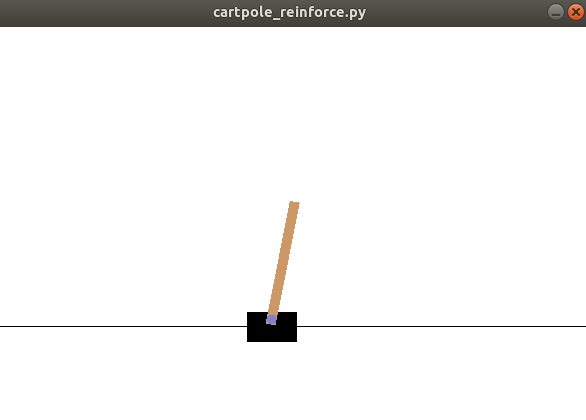从这里开始换个游戏演示,cartpole游戏


1 import sys 2 import gym 3 import pylab 4 import random 5 import numpy as np 6 from collections import deque 7 from keras.layers import Dense 8 from keras.optimizers import Adam 9 from keras.models import Sequential 10 11 EPISODES = 300 12 13 14 # DQN Agent for the Cartpole 15 # it uses Neural Network to approximate q function,使用神经网络近似q-learning的q函数 16 # and experience replay memory & fixed target q network 17 class DQNAgent: 18 def __init__(self, state_size, action_size): 19 # if you want to see Cartpole learning, then change to True 20 self.render = True 21 self.load_model = False 22 23 # get size of state and action 24 self.state_size = state_size 25 self.action_size = action_size 26 27 # These are hyper parameters for the DQN 28 self.discount_factor = 0.99 29 self.learning_rate = 0.001 30 self.epsilon = 1.0 31 self.epsilon_decay = 0.999 32 self.epsilon_min = 0.01 33 self.batch_size = 64 34 self.train_start = 1000 35 # create replay memory using deque 36 self.memory = deque(maxlen=2000) 37 38 # create main model and target model 39 self.model = self.build_model() 40 self.target_model = self.build_model() 41 42 # initialize target model 43 self.update_target_model() 44 45 if self.load_model: 46 self.model.load_weights("./save_model/cartpole_dqn.h5") 47 48 # approximate Q function using Neural Network 49 # state is input and Q Value of each action is output of network 50 def build_model(self): 51 model = Sequential() 52 model.add(Dense(24, input_dim=self.state_size, activation='relu', 53 kernel_initializer='he_uniform')) 54 model.add(Dense(24, activation='relu', 55 kernel_initializer='he_uniform')) 56 model.add(Dense(self.action_size, activation='linear', 57 kernel_initializer='he_uniform')) 58 model.summary() 59 model.compile(loss='mse', optimizer=Adam(lr=self.learning_rate)) 60 return model 61 62 # after some time interval update the target model to be same with model 63 def update_target_model(self): 64 self.target_model.set_weights(self.model.get_weights()) 65 66 # get action from model using epsilon-greedy policy 67 def get_action(self, state): 68 if np.random.rand() <= self.epsilon: 69 return random.randrange(self.action_size) 70 else: 71 q_value = self.model.predict(state)#2,q(s,a),利用模型预测不同action的q值,选大的作为下一action 72 return np.argmax(q_value[0]) 73 74 # save sample <s,a,r,s'> to the replay memory 75 def append_sample(self, state, action, reward, next_state, done): 76 self.memory.append((state, action, reward, next_state, done)) 77 if self.epsilon > self.epsilon_min: 78 self.epsilon *= self.epsilon_decay 79 80 # pick samples randomly from replay memory (with batch_size) 81 def train_model(self): 82 if len(self.memory) < self.train_start: 83 return 84 import pdb; pdb.set_trace() 85 batch_size = min(self.batch_size, len(self.memory)) 86 mini_batch = random.sample(self.memory, batch_size)#64list 87 #(array([[-0.04263461, -0.00657423, 0.00506589, -0.00200269]]), 0, 1.0, array([[-0.04276609, -0.20176846, 0.00502584, 0.29227427]]), False) 88 89 update_input = np.zeros((batch_size, self.state_size)) 90 update_target = np.zeros((batch_size, self.state_size)) 91 action, reward, done = [], [], [] 92 93 for i in range(self.batch_size): 94 update_input[i] = mini_batch[i][0] 95 action.append(mini_batch[i][1]) 96 reward.append(mini_batch[i][2]) 97 update_target[i] = mini_batch[i][3] 98 done.append(mini_batch[i][4]) 99 100 target = self.model.predict(update_input)#(64,2) 101 target_val = self.target_model.predict(update_target)#(64, 2) 102 103 for i in range(self.batch_size): 104 # Q Learning: get maximum Q value at s' from target model 105 if done[i]: 106 target[i][action[i]] = reward[i] 107 else: 108 target[i][action[i]] = reward[i] + self.discount_factor * ( 109 np.amax(target_val[i]))#off-policy 更新 110 111 # and do the model fit! 112 self.model.fit(update_input, target, batch_size=self.batch_size, 113 epochs=1, verbose=0) 114 115 116 if __name__ == "__main__": 117 # In case of CartPole-v1, maximum length of episode is 500 118 env = gym.make('CartPole-v1') 119 # get size of state and action from environment 120 state_size = env.observation_space.shape[0]#4 121 action_size = env.action_space.n#2 122 123 agent = DQNAgent(state_size, action_size) 124 125 scores, episodes = [], [] 126 127 for e in range(EPISODES): 128 done = False 129 score = 0 130 state = env.reset() 131 state = np.reshape(state, [1, state_size]) 132 133 while not done: 134 if agent.render: 135 env.render() 136 137 # get action for the current state and go one step in environment 138 action = agent.get_action(state) 139 next_state, reward, done, info = env.step(action) 140 next_state = np.reshape(next_state, [1, state_size]) 141 # if an action make the episode end, then gives penalty of -100 142 reward = reward if not done or score == 499 else -100 143 144 # save the sample <s, a, r, s'> to the replay memory 145 agent.append_sample(state, action, reward, next_state, done) 146 # every time step do the training 147 agent.train_model() 148 score += reward 149 state = next_state 150 151 if done: 152 # every episode update the target model to be same with model 153 agent.update_target_model() 154 155 # every episode, plot the play time 156 score = score if score == 500 else score + 100 157 scores.append(score) 158 episodes.append(e) 159 pylab.plot(episodes, scores, 'b') 160 pylab.savefig("./save_graph/cartpole_dqn.png") 161 print("episode:", e, " score:", score, " memory length:", 162 len(agent.memory), " epsilon:", agent.epsilon) 163 164 # if the mean of scores of last 10 episode is bigger than 490 165 # stop training 166 if np.mean(scores[-min(10, len(scores)):]) > 490: 167 sys.exit() 168 169 # save the model 170 if e % 50 == 0: 171 agent.model.save_weights("./save_model/cartpole_dqn.h5")